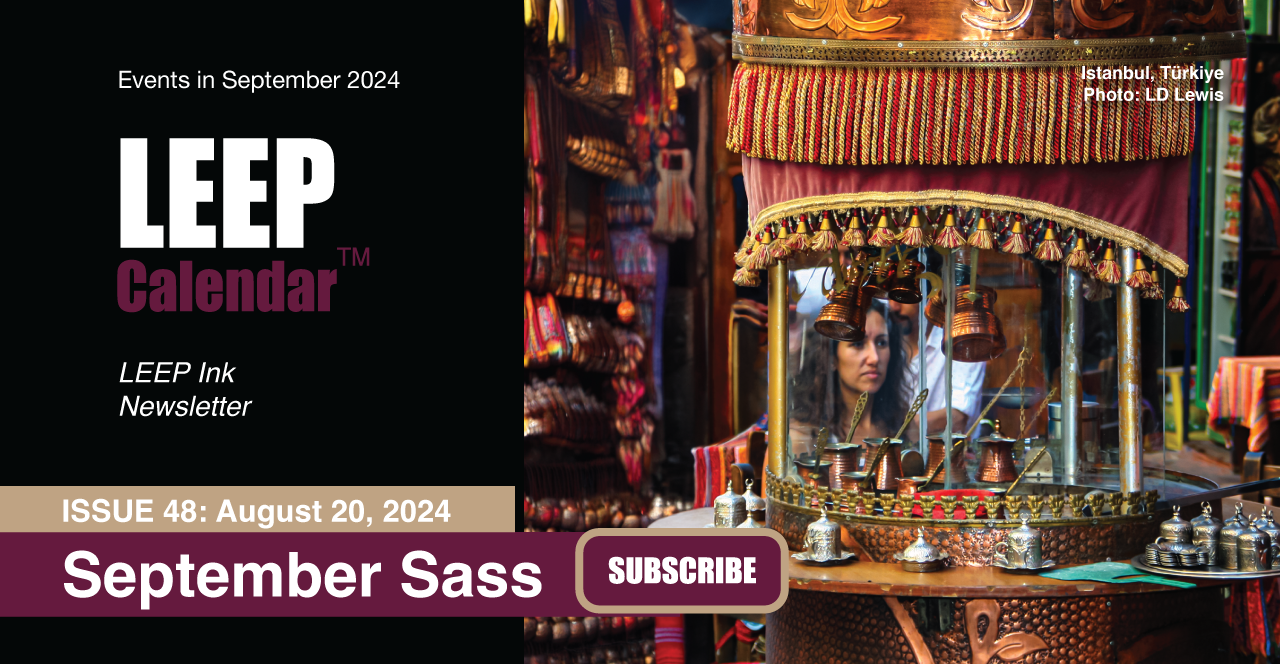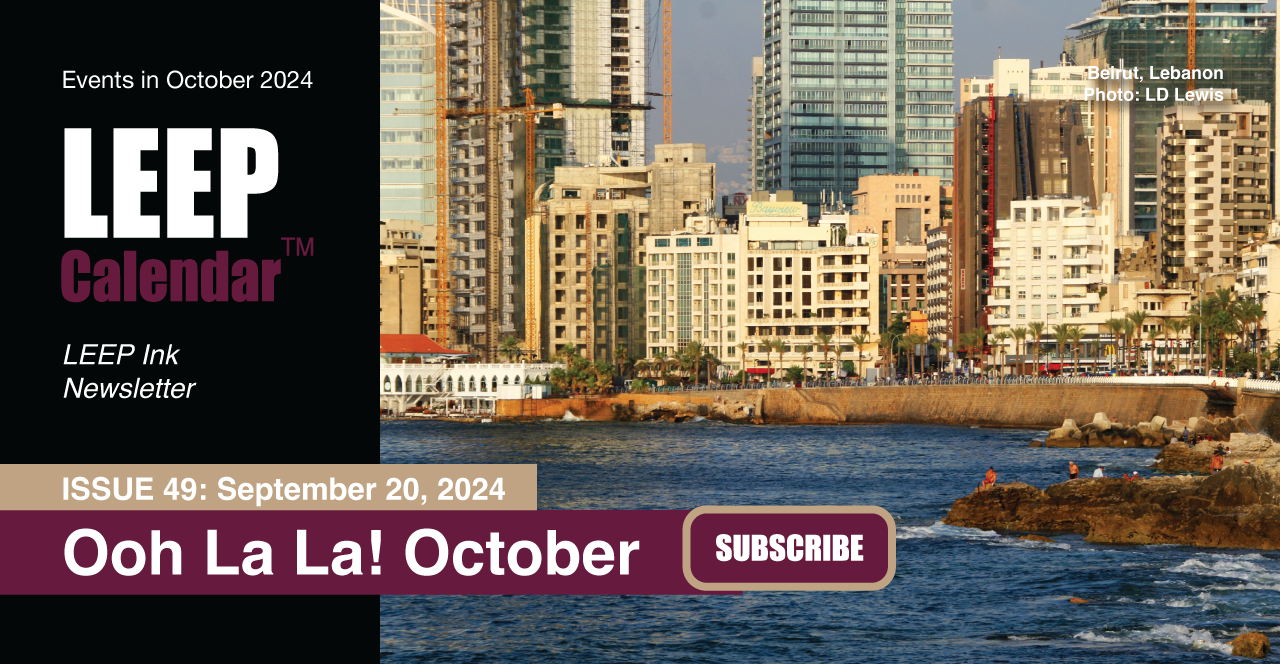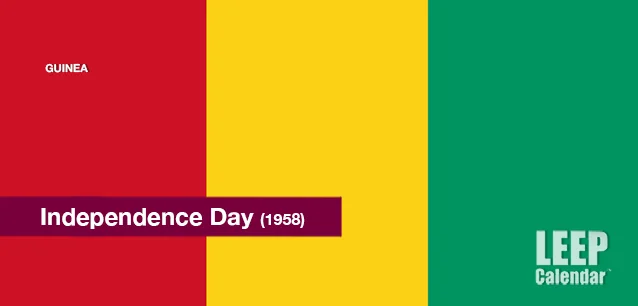 AD
AD
Country
- Africa
- Alcohol, Tobacco & Drugs
- Animals, Fish, Insects & Birds
- Anniversaries
- Australia
- Books
- Brazil & S.America
- Buddhism
Category
- Afghanistan, AF
- Aland Island, AX
- Albania, AL
- Algeria, DZ
- American, Samoa, AS
- Andarra, AD
- Angola, AO
- Anguilla, Al
Event Type
- Daily
- Weekly
- Annual
- Recurring
Duration
- All
- 1 Day
- 2 Day
- 3 Day
- 4 Day
- 5 Day
- 6 Day
Event Type
- Daily
- weekly
- Annual
- Recurring
Event Type
- Daily
- weekly
- Annual
- Recurring
Today is: October 18
Beard Day (No)
Birth of the Bab (1819)
Chocolate Cupcake Day
Fall Festival of Leaves, Ross County (US-OH)
Independence Day Holiday, (AZ)(1991)
Mammography Day, Ntl.
Menopause Day, World
Missouri Day Festival and High School Band Competition (US-MO)
Opossum Day, Ntl. (CA)
Person's Day (CA)(1929)
Saint Luke Feast Day
Squash Day, World
Anti-Poverty Week, (AU)
Baking Week, Ntl. (UK)
Bone and Joint Action Week, Ntl.
Case Management Week, Ntl.
Coffee Week, (UK)
Earth Science Week
Felabration (NG)
Food Bank Week, Ntl.
Food and Drug Interaction Education Week
Foot Health Week (AU)
Healthcare Central Service and Sterile Processing Week
Infection Prevention Week, Intl.
MassKara Festival (PH)
Newspaper Week (JP)
Nutrition Week (AU)
OCD Awareness Week, Intl.
Pet Peeve Week, Ntl.
Recycle Now Week (UK)
Recycle Week, Ntl. (UK)
School Safety Week, Ntl (CA)
Storytelling Festival, Scottish Intl. (UK)
Sukkot (J)
Take Your Medicine Week, America
Urban Wildlife Week, Intl.
Veterans' Health Week (AU)
Wildlife Refuge Week, Ntl.
ADHD Awareness Month
Adopt-a-Dog Month, (AHA)
Adopt-a-Shelter Dog Month
Advertising, Co-op Advertising Awareness Month
Animal Safety and Protection Month, Ntl.
Antidepressant Death Awareness Month
Anxiety and Depression Awareness Month (AU)
Apple Month, Ntl.
Applejack Month
AquaTober
Architecture Month, Archtober
Arts and Humanities Month, Ntl.
Autism Awareness Month (CA)
Bake and Decorate Month, Ntl.
Bat Appreciation Month
Battery Safety Month (Auto)
Bi-national Health Week (US/CA/MX-varies locally)
Big Draw, The
Bilingual Child Month, Celebrating the
Black History Month (UK)
Black Speculative Fiction Month
Blind Month, National Meet the
Blindness Awareness Month
Book Month, Ntl.
Breast Cancer Awareness Month, Ntl.
Bullying Month, Stop, Ntl.
Bullying Prevention Month, Ntl.
Caffeine Addiction Recovery Month
Car Care Month, Ntl. Fall
Caramel Month, Ntl.
Celiac Awareness Month (US)
Cheese Month, American
Chili Month, Ntl.
Chiropractic Health Month, Ntl.
Church Library Month
Church Safety and Security Month, Ntl.
City, Urban October
Class Reunion Month
Clergy Appreciation Month
Co-op Awareness Month
Collegiate Alcohol Awareness Month, Ntl.
Company Culture Month, Global
Computer Learning Month
Contact Lens Safety Month
Cookie Month
Country Ham Month
Country Music Month
Crime Prevention Month, Ntl.
Critical Illness Awareness Month
Cybersecurity Month, Ntl.
Danger Run (US-KY, IN, IL)
Danger Run (US-KY, IN, IL)
Dental Hygiene Month, Ntl.
Depression Education and Awareness Month
Dessert Month, Ntl.
Disability Employment Awareness Month
Diversity Awareness Month, Global
Domestic Violence Awareness Month
Down Syndrome Month, Ntl.
Dyslexia Awareness Month
Eat Better—Eat Together Month
Eczema Awareness Month
Emotional Intelligence Awareness Month
Energy Action Month, Ntl.
Ergonomics Month, Ntl.
Eye Injury Prevention Month
Fair Trade Month
Family History Month
Festival of Penha (BR-RJ)
Filipino American History Month (1587)
Financial Planning Month
Freethought, Month of, Ntl.
Gain the Inside Advantage Month, Ntl.
Gay and Lesbian History Month (1979)
German-American Heritage Month (1683)
Girls Night In (AU)
Go Sober Month (UK)
Golf Month, Australia
Great Cycle Challenge (AU)
Halloween Safety Month
Head Start Awareness Month
Health Literacy Month
Healthy Lung Month
Healthy Workplace Month (CA)
Hearing, Audiology Awareness Month, Ntl.
Hemophilia, Bleeding Disorders Month, Ntl. (AU)
Hog-out Month (US-TX)
Home Eye Safety Month
Indigenous Peoples Month, Ntl. (PH)
Islamic History Month (CA)
Italian-American Heritage Month (1492)
Kartika (H)
Katik (S)
Kitchen and Bath Month, Ntl.
Learning Disabilities Month, Ntl. (CA/US)
Learning and Development Month, Ntl.
Liver Awareness Month, Ntl.
Long Term Care Planning Month
Lupus Awareness Month (UK)
Medical Librarians Month, Ntl.
Medicine Abuse Awareness, Ntl.
Menopause Month, World
Museums and Galleries Month (PH)
Muslim American Heritage Month (US)
National Sausage Month
Non-GMO Month, Ntl.
Organize Your Medical Information Month
Orthodontic Health Month, Ntl.
Pasta Month, Ntl.
Pedestrian Safety Month
Pescatarian Month, Ntl.
Pet Wellness Awareness Month, Ntl.
Pharmacist Month, American
Photographer Appreciation Month
Physical Therapy Month, Ntl.
Pickled Peppers Month
Pink Ribbon Breakfast (AU)
Pit Bull Awareness Month, Ntl.
Pituitary Awareness Month (UK)
Pizza Month, Ntl. (1984)
Polio Awareness Month, (CA/AU)
Polish-American Heritage Month
Popcorn Poppin' Month, Ntl.
Positive Attitude Month
Prenatal-onset GBS Disease Recognition Month
Pretzel Month, Ntl.
Principal's Month, Ntl.
Protect Your Hearing Month, Ntl.
Rabi al-Thani (M)
Reading Group Month, Ntl. (1917)
Rett Syndrome Awareness Month
Riyadh Season 2024 (SA)
Roller Skating Month, Ntl.
STEM Mentoring Month
Sarcastic Awareness Month
School Libraries Month, Intl.
Seafood Month
Seed Gathering Seasons (UK)
Senior's Month (AU-QLD)
Sensory Awareness Month, Ntl.
Shoctober - Defibrillator National Awareness Month (AU)
Spina Bifida Awareness Month, Ntl.
Spinach Lovers Month
Spinal Health Month, Ntl.
Squirrel Awareness and Appreciation Month
Stamp Collecting Month, Ntl
Stop America's Violence Everywhere (SAVE) Month
Substance Abuse Preservation Month, Ntl.
Sudden Infant Death Syndrome (SIDS) Awareness Month
Sunday School Teacher Appreciation Month
Teentober
Tishrei (J)
Turner Prize Exhibition (UK)
U.S.-Mexico Border Health Month
Ultrasound Awareness Month
Unblocktober (UK)
Unblocktober (UK)
Vegetarian Month
Walk To School Month, Intl.
Window Covering Safety Month, Ntl.
Winter Weather Preparedness Weeks (Varies by Location)
Wishbones for Pets (US/CA)
Women's History Month (CA)
Women's Small Business Month
Work and Family Month, Ntl.
Workplace Politics Awareness Month
Youth Justice Action Month, Ntl.
LEEP Calendar
Scroll to explore events active on this date.
Additional Events on LEEP
LEEP INK FEATURES

August is Appropos
A toddler playing in the fountain at a park in Santa Fe, New Mexico—Photo LD Lewis. In August, we live through the Dog Days of Summer. It's hot and often humid, and those ...

September is Sassy
Can you hear that sigh of relief from parents worldwide? Yes! September marks the return of students to school, a global phenomenon. Preparations for the ACT and SATs begin earnestly for ...

OOH LA LA, October
October is the busiest month for events, with 5% more happening than in May, the second most eventful month. Sailing enthusiasts will be glued to the finals of this year's Am...
About Guinea Independence Day
Civil Rights , Africa
Ends: Oct 02, 2024
DESCRIPTION:
AN END TO COLONIALISM:
GUINEA INDEPENDENCE DAY
Guinea Independence Day is celebrated annually on October 2nd to mark the day in 1958 when the West African nation of Guinea became the first French colony in Africa to gain independence. This day is a significant milestone in Guinea's history, symbolizing the nation's struggle for freedom and its break from colonial rule.
HISTORY
The road to Guinea's independence began mid-20th century, as nationalist movements gained momentum across Africa. In 1958, under the leadership of Ahmed Sékou Touré, Guinea boldly rejected the French Community proposed by French President Charles de Gaulle, which would have granted the country limited autonomy while keeping it under French control. Instead, Guinea opted for complete independence, becoming the first French colony in sub-Saharan Africa. Guinea officially declared independence on October 2, 1958, with Sékou Touré becoming the country's first president.
Guinea's decision had a profound impact on the decolonization process in Africa. It inspired other African nations to pursue their independence and marked the beginning of the end of colonial rule on the continent. Guinea's independence also symbolized a strong assertion of African sovereignty and self-determination.
CELEBRATING INDEPENDENCE
Guinea Independence Day is celebrated with official ceremonies, cultural events, and public festivities. The capital city, Conakry, becomes the center of national celebrations, where government officials, military leaders, and citizens gather to commemorate the country's independence.
The day typically begins with a military parade showcasing Guinea's armed forces. This is followed by speeches from political leaders, including the president, who reflect on the nation's history, achievements, and future goals. Cultural performances, including traditional music, dance, and storytelling, are essential to the celebrations, highlighting the rich cultural heritage of Guinea's diverse ethnic groups.
Local communities throughout the country participate in various events, such as sporting competitions, educational programs, and exhibitions, that promote national pride and unity. The day is also an opportunity for Guineans to reflect on the challenges and progress since independence, with discussions on democracy, development, and social justice.
WHY ARE THERE SO MANY COUNTRIES CALLED GUINEA?
The name "Guinea" is shared by several African countries, including Guinea, Guinea-Bissau, and Equatorial Guinea, as well as the Gulf of Guinea in West Africa and Papua New Guinea in Oceania. The name's origin is somewhat ambiguous, but it is believed to have been derived from the Berber word "Akal n-Iguinawen," meaning "Land of the Black People."
European explorers and traders in the 15th century used "Guinea" as a general term to describe the coastal regions of West Africa where they encountered the indigenous peoples. Over time, the name became associated with various parts of the area, leading to its adoption by different colonial powers.
—Guinea (formerly French Guinea) gained its name during French colonization.
—Guinea-Bissau was named after its capital, Bissau, to distinguish it from French Guinea when it was a Portuguese colony.
—Equatorial Guinea was named for its location near the equator and was a Spanish colony.
—Papua New Guinea:
Other explorers used the term "Papua" earlier. It comes from the Malay word "papuwah," meaning "frizzy-haired," referring to the hair texture of the Indigenous Melanesian people. Over time, the name "Papua" was combined with "New Guinea" to describe the entire island, with the eastern half eventually becoming the independent state of Papua New Guinea in 1975.
Using "Guinea" in multiple country names reflects the shared colonial history and the geographical association with the West African coast, a key area for European exploration and trade.
Guinea Independence Day celebrates the country's historic decision to break free from colonial rule and assert sovereignty. It is a day of national pride, cultural expression, and reflection on the journey toward building a solid and independent nation. The shared name "Guinea" among different countries highlights the region's rich history and the legacy of European exploration and colonization in Africa.
VIDEOS
SUPPORTING DOCUMENTS
Currently, this event does not have supporting documents.
ADDITIONAL IMAGES
Currently, this event does not have supporting images.
Where would you like to go now?
 AD
AD
By using this site. You are agreeing to use of cookies. Learn more in our Privacy Policy
/footer-logo.svg)
LEGAL: Excerpts and links may be used, provided that full and clear attribution is given to Jubilee LLC and LEEPCalendar.com, with appropriate and specific direction to the original content (Page URL). Additional documents, embedded videos and additional image rights retained by their creators and are provided to increase understanding of the event or topic.
Jubilee LLC reserves the right to accept or reject inclusion of events in this calendar. The appearance of an event in LEEP Calendar does not imply endorsement of the event, nor the organization championing the event by Jubilee LLC, its stakeholders, customers or subsidiaries. All dates, contact information, URLs, addresses, and information relating to any event, promotion or holiday are subject to change without notice and should be treated as estimated. Jubilee LLC, our stakeholders, customers and subsidiaries cannot warrant accuracy. Users of this application are solely responsible for verifying actual event date with organizers and additional sources prior to committing resources, financial, human or otherwise.


